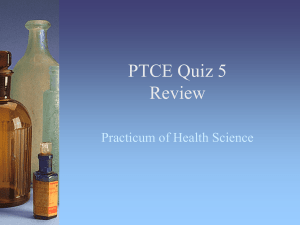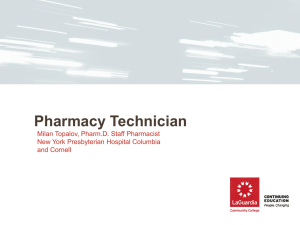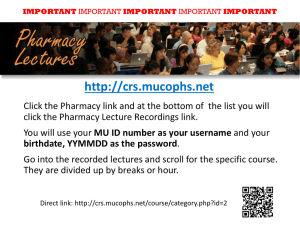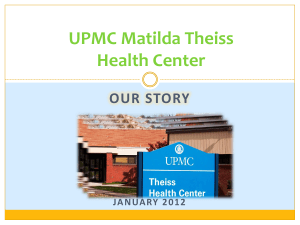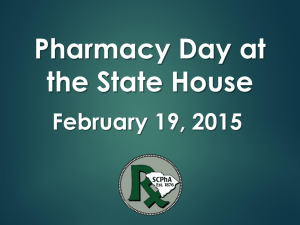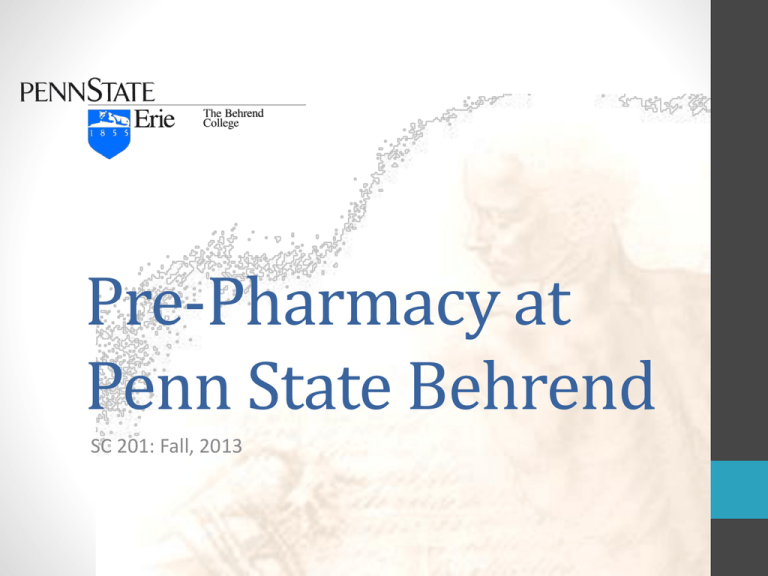
Pre-Pharmacy at
Penn State Behrend
SC 201: Fall, 2013
History of Pharmacy
Ancient Origins
• Earliest known record of apothecary practice, approximately
2,600 BC
• Healers combined roles of priest, pharmacist, and physician
• Clay tablets recorded symptoms of illness, prescriptions, and
instructions for compounding remedies
History of Pharmacy
Parallel Development in Several Civilizations
China
• Emperor Shen Nung researched the medicinal value of herbs,
testing many of them on himself (2,000 BC)
• Wrote the first Pen T-Sao, or native herbal, recording 365 drugs
Egypt
• Papyrus Ebers (1,500 BCE)
• Most important ancient pharmaceutical record - collection of 800
prescriptions; specifically mentions 700 unique drugs
History of Pharmacy
Development in Several Civilizations
India
• Charaka Samhita recorded more than 2,000 drugs (1,000 BC)
• Meaning “compendium of wandering physicians,” it was the work
of multiple authors
Greece
• Terra Sigilata, or "sealed earth", was the first therapeutic agent to
bear a trademark (500 BC)
• Originated in Greece before Composed of sacred clay that was
blessed, refined, shaped into uniform tablets, impressed with an
official seal, sun-dried, and then distributed commercially
History of Pharmacy
Development in Several Civilizations
India
• Charaka Samhita recorded more than 2,000 drugs (1,000 BC)
• Meaning “compendium of wandering physicians,” it was the work
of multiple authors
Greece
• Terra Sigilata, or "sealed earth", was the first therapeutic agent to
bear a trademark (500 BC)
• Originated in Greece before Composed of sacred clay that was
blessed, refined, shaped into uniform tablets, impressed with an
official seal, sun-dried, and then distributed commercially
History of Pharmacy
Greece
Theophrastus – “the father of botany” (300 BC)
• One of the greatest early Greek philosophers and natural
scientists
• Observed and wrote extensively on the medicinal qualities of
herbs - unusually accurate observations
Hippocrates
• Greek physician (460 - 377 BC) – “the father of medicine”
• Rejected that illness was connected to mystic or demonic forces
and positioned medicine as a branch of science
• Published more than 70 writings related to the practice of
medicine and apothecary
History of Pharmacy
Development of the Apothecary
• In 8th century, Arab practitioners separated the arts of the
apothecary and physician
• The first apothecaries, or privately owned drug stores, appeared
• Traders brought the new system of pharmacy to Europe and
Africa
History of Pharmacy
Development of the Pharmacopeia
• The first pharmacopeia, the Nuovo Receptario, was published in
Florence, Italy, in 1498
• One of the earliest constructive collaborations between the Guild
of Apothecaries and the Medical Society
• The First Anglo-Saxon
Organization for Pharmacists:
The Guild of Grocers
monopolized trade in drugs
and spices
• In 1617, King James I formed a
separate company for
apothecaries
History of Pharmacy
18th Century
• America’s first female pharmacist, Elizabeth Marshall
• America’s first hospital, Philadelphia, 1751
• Founded by Benjamin Franklin
• Pharmacy began operations in 1752
• John Morgan, pharmacist and physician
• Advocated written prescriptions
• Advocated for the independent practice of the two profession
• U.S. first Apothecary General, Andrew Craigie
• Duties included procurement, storage, manufacture, and
distribution of the Army's drugs
• Also developed an early pharmaceutical wholesaling and
manufacturing business
History of Pharmacy
19th Century
• America’s first college of pharmacy, the Philadelphia College of
Pharmacy
• The American Pharmaceutical Association
• Founded to meet the needs for better intercommunication
among pharmacists
• Set standards for education and apprenticeship
• Began quality control over imported drugs
History of Pharmacy
19th Century
William Procter, Jr. ”father of American pharmacy”
• Graduated from the Philadelphia College of Pharmacy in 1837
• Operated a retail pharmacy
• Served as professor of pharmacy for 20 years
• Was a leader in founding the American Pharmaceutical
Association
• Editor of the American Journal of Pharmacy for 22 years
History of Pharmacy
20th Century
• The American Council on Pharmaceutical Education
• Founded in 1932 to establish standards for pharmacy
education
• Initially established standards for baccalaureate degree in
pharmacy; added the doctor of pharmacy standards as an
alternative
History of Pharmacy
20th Century
• Traditional Era (1900–1930): formulating and dispensing
drugs derived from natural sources
• Scientific Era (1930–1960): development of new drugs;
scientific testing; mass production of synthetic drugs and
antibiotics
• Clinical Era (1960–1990): pharmacists expected to
dispense drug information, warnings, advice, and
suggestions to patients
History of Pharmacy
21st Century
• The Pharmaceutical Care Era (current era): practice of pharmacy
focused on ensuring positive outcomes for drug-related therapies
• Biotechnology: treatment of cancer or cancer-related conditions
• Drugs are produced using living organisms such as yeast,
bacteria, or mammalian cells
• The majority are manufactured through recombinant DNA
technology
• A human gene capable of triggering specific protein production
is inserted into a living organism and cultured in a laboratory
• The organism incorporates the gene into its cell structure, and
begins producing the desired protein (drug)
History of Pharmacy
21st Century
• Pharmacogenomics:
• Predicts whether a patient will have a severe, negative reaction
to a prescribed medication
• Simple, rapid DNA test used
• May aid in selection of better medications for patient
• Still in development
What Is Pharmacy?
•
•
•
•
•
•
Responsibilities include a range of care for patients, from dispensing
medications to monitoring patient health and progress in order to
maximize their response to medication.
Educate consumers and patients on the use of prescriptions and
over the counter medications.
Advise physicians, nurses and other health professionals on drug
decisions.
Provide expertise about the composition of drugs, including their
chemical, biological and physical properties and their manufacture
and use.
Ensure drug purity and strength and make sure that drugs do not
interact in a harmful way.
Pharmacists are drug information experts ultimately concerned
about their patients’ health and wellness.
What Are The Work Environments?
• Community pharmacies: Approximately 62% of pharmacists work
in community pharmacies. These can include independentlyowned pharmacies, chain pharmacies, pharmacy departments in
food or discount stores, or professional health centers.
• Other direct health care facilities: Other practice opportunities
exist for pharmacists in hospitals, home health care, nursing
homes and extended care facilities, neighborhood health centers,
and health maintenance organizations.
What Are The Work Environments?
• Private industry: Pharmacists are also employed by firms that
discover, develop and produce chemicals, prescriptions and
nonprescriptive drugs and other health products.
• Government: Pharmacists hold staff and supervisory posts in the
US Public Health Service, the Department of Health and Human
Services, the Department of Veteran Affairs, the Food and Drug
Administration and the Armed Services.
What Are The Areas of Specialization?
Academic Pharmacy :
• Over 3,000 full-time faculty members
work in the nation's colleges and schools
of pharmacy.
• They are involved with teaching, research,
public service, and patient care.
• Others serve as consultants for local, state,
national, and international organizations.
• Faculty Shortage survey by AACP: total of
417 vacant teaching posts
What Are The Areas of Specialization?
Benefits of a Career in Academic Pharmacy
• Opportunity to contribute to scientific and clinical knowledge
• Freedom to be creative and pursue own interests
• Develop an identity within specialty and enhance career
• Ability to collaborate with other professionals
• Personal satisfaction from training of students, residents, fellows,
graduate students
What Are The Areas of Specialization?
Community Pharmacy: Chain or Independent
• ”It's all about people." From helping with
aches and pains, to educating patients about
sophisticated drug therapies, to helping sick
patients cope with their feelings...
pharmacists forge relationships with their
patients.
• For more than 22 years, pharmacists have
ranked at or near the top of the Gallup Poll
ranking of the "most trusted professionals.”
• The pharmacist is their primary source of
health information!
What Are The Areas of Specialization?
Community Pharmacy: Chain or Independent
• Strong interpersonal and verbal
communication skills
• Fast-paced environment, requiring intense
focus, organization, and efficiency
• The ability to communicate on many levels is
key: scientifically with health professionals
and simply for patients.
• Starting salaries $75,000 a year, with potential
for growth. Severe demand is expected to
intensify through 2020.
What Are The Areas of Specialization?
Community Pharmacy: Chain or Independent
• Patient Care Opportunities:
• Certified to vaccinate patients
• Disease state management in areas
covering diabetes, high blood pressure,
high cholesterol, etc.
• They also have many other patient care
opportunities, including smoking cessation
programs, compounding specialties, herbal
and other alternative drug therapies, and
screening programs such as those to detect
osteoporosis and high cholesterol.
What Are The Areas of Specialization?
Community Pharmacy: Chain or Independent
• Patient Care Opportunities:
• Certified to vaccinate patients
• Disease state management in areas
covering diabetes, high blood pressure,
high cholesterol, etc.
• They also have many other patient care
opportunities, including smoking cessation
programs, compounding specialties, herbal
and other alternative drug therapies, and
screening programs such as those to detect
osteoporosis and high cholesterol.
What Are The Areas of Specialization?
Consultant pharmacy
• Discipline where pharmacists provide a broad
spectrum of administrative, distributive and
clinical services to nursing homes, communitybased care, adult day care, correctional
facilities and individuals living in their own
homes.
• Experts in geriatric medication management
What Are The Areas of Specialization?
Consultant pharmacy
• "Let's see if I can get this straight," says Linda Smith, leaning
forward toward the burly 45-year- old. "You do your blood sugar
reading and then you take your multivitamins and vitamin E and
Garlique about an hour later. Then you take the lactulose in
between. Then you're taking the Glucotrol XL, your diabetes
medicine.
• "Then do you also take your blood pressure medicine at that time -the Vasotec or enalapril? And you take the Elavil in the evening for
the pain in your heel?"
• Caudle takes off his wire-rimmed glasses, rubs his eyes. Three years
ago he stopped a 27-year smoking habit, but now he looks like he'd
like to light up.
What Are The Areas of Specialization?
Consultant pharmacy
• "I feel like I'm on so many medications. I feel like I'm on a pill for
everything," Caudle says. He's concerned that he may end up like
his father, who also had diabetes and died a few years ago of a
heart attack. "I think that's one of the reasons my father passed
away. . . . At the end he was taking 30 to 40 pills a day."
Just as any good physician would, Smith listens with empathy. But
she's no doctor. She's a pharmacist who, after more than 25 years
working for others, struck out on her own about two years ago.
She's reinvented herself as an independent pharmacy consultant -- a
pharmacist who counsels patients for a fee.
What Are The Areas of Specialization?
Federal Opportunities
What Are The Areas of Specialization?
Federal Opportunities
US Public Health Service
• Overseen by the Surgeon General, the U.S. Public
Health Service Commissioned Corps is a diverse
team of more than 6,500 highly qualified, public
health professionals. Driven by a passion to serve
the underserved, these men and women fill
essential public health leadership and clinical
service roles with the Nation’s Federal
Government agencies.
What Are The Areas of Specialization?
Federal Opportunities
US Public Health Service
What Are The Areas of Specialization?
Hospital and Institutional Pharmacy
• Increased number of pharmacists now practice in hospitals,
nursing homes, extended care facilities, neighborhood health
centers, and health maintenance organizations.
• Opportunity for direct involvement with patient care.
• Serve as an authoritative source of drug information for
physicians, nurses, and patients.
• They are responsible for systems that control drug distribution
and are designed to assure that each patient receives the
appropriate medication, in the correct form and dosage, at the
correct time.
What Are The Areas of Specialization?
Hospital and Institutional Pharmacy
• Maintain records on each patient, using them not only to fill
medication orders but also to screen for drug allergies and adverse
drug effects.
• Includes specialized areas, including nuclear pharmacy, drug and
poison information, and intravenous therapy.
• Bring other expertise including finance and budgeting, personnel
administration, systems development, and planning.
• Approximately 38,000 licensed pharmacists work on a full or parttime basis in hospitals or nursing homes. Pharmacist Participation in
Hospital Rounds Can Reduce Medication Errors
• "Drug-related morbidity is costly to society. Drug-related problems
(DRPs) have been associated with between 6% and 28% of hospital
admissions in studies in the United States, and the annual costs
associated with preventable drug-related morbidity have been
estimated to be $177.4 billion in the United States and $10.9 billion
in Canada... Studies in hospital and clinic settings have shown that
What Are The Areas of Specialization?
Hospital and Institutional Pharmacy
Pharmacist Participation in Hospital Rounds Can Reduce Medication
Errors
• Drug-related problems have been associated with between 6% and
28% of hospital admissions in studies in the United States, and the
annual costs associated with preventable drug-related morbidity
have been estimated to be $177.4 billion in the United States
• Studies in hospital and clinic settings have shown that 78% fewer
preventable adverse drug events occurred among patients in a
hospital when a pharmacist participated in weekday medical rounds
• When a pharmacist participated in the daily medical rounds,
medication errors were reduced by 51%. Nearly 80% of the patients
in the control group had a medication error, the study found.
What Are The Areas of Specialization?
Informatics
• Combination of the pharmacy practice environment and
information technology
• Pharmacy informaticists work collaboratively with other health
care professionals to ensure that appropriate systems are in place
to support an informed practice environment.
• These systems include e-prescribing, computerized prescriber
order entry (CPOE), electronic medical records (EMR), bar code
dispensing and administration systems, and automated dispensing
cabinets.
What Are The Areas of Specialization?
Informatics
• All PharmD programs are required to provide pharmacy
informatics education. Some programs provide elective and
experiential pharmacy informatics education.
• Graduates can also pursue additional education and training
through residencies, fellowships, and graduate school.
• Employed by hospitals, information systems companies that
support acute and ambulatory care, governmental agencies,
colleges of pharmacy, knowledge vendors (First DataBank,
Multum, etc.), and a variety of other opportunities.
What Are The Areas of Specialization?
Managed Care Pharmacy
• Managed care is an organized approach
to health care delivery that seeks to
improve the quality and accessibility of
health care—including medication
therapy—in cost-effective manner.
• Pharmaceutical expenditures have grown
more rapidly than any other component
in the health care system as a result of
1. Increased use of prescription medications
2. Number of people covered by drug
benefits
3. Introduction of expensive new drugs into
the market-place.
What Are The Areas of Specialization?
Pharmaceutical Sciences/Industry
• Direct involvement in the development and clinical testing of
new pharmaceuticals and drug delivery methods
• Analysis and Pharmaceutical Quality
• Biotechnology
• Clinical Pharmacology and Translational Research
• Drug Design and Discovery
• Formulation Design and Development
• Manufacturing Science and Engineering
• Pharmacokinetics, Pharmacodynamics and
Drug Metabolism
• Physical Pharmacy and Biopharmaceutics
• Regulatory Sciences
What Are The Areas of Specialization?
What is the Difference Between a Pharmaceutical Scientist and
a Pharmacist?
• Pharmaceutical scientists are typically involved in the
development of new drugs: discovery, drug delivery systems,
drug absorption, distribution, metabolism, and elimination
characteristics. They spend most of their time doing research
in a laboratory or office setting.
• On the other hand, pharmacists work with existing drugs,
patients, and other healthcare practitioners
to optimize patient care and drug use. They often work faceto-face with physicians (drug selection and use)
and patients (best use of medications)
What Are the Job Prospects?
US News and World Report
#3 Pharmacist
• Excellent job prospects and a solid average salary.
• Possessors of a Pharm.D can anticipate nearly 70,000
available jobs this decade—the brunt in physician
offices, outpatient care centers, and nursing homes.
To see the complete list of 100 best jobs: usnews.com/100bestjobs
What Are the Job Prospects?
Why?
• Estimated need for pharmacists to fulfill care and
distributive roles in 2020 is 417,000; shortfall in supply
estimated at 157,000 (Knapp, DA, Am J Pharm Ed 2002;66:421-9)
• Aggregate Demand Index continues to show imbalance
between supply and demand
(Knapp, KK, http://www.pharmacymanpower.com)
• Pharmacists report “excessively high” workload
(Schommer, et al. J Am. Pharm. Assoc. 2006:340-7)
• Number of elderly will double from 2000-2030; # of
prescriptions per patient is markedly higher for those
over 65.
What Are the Job Prospects?
Why?
• Salary Outlook: median annual salary for a pharmacist
was $113,390 in 2011.
• The field's best-compensated areas include residential
mental health or rehabilitation facilities and consulting
services.
Reasons to Choose Pharmacy?
Personal Abilities of a Pharmacist
• Genuine interest in people and medicine
• High ethical standards and the ability to meet the pharmacy’s
demands for judgment, dependability, and conscientious performance
• Strong attention to detail
• An ability to communicate well with patients and healthcare providers
• Emotional stability, calm mind, decision making ability and etiquettes
to deal with variety of people
Preparing for Pharmacy School
Best Resource by far!
http://www.aacp.org
Complete compendium of all pharmacy school requirement, class
statistics and graduation rates. More complete than for any other
pre-health profession!
Preparing for Pharmacy School
For example: Auburn University
Preparing for Pharmacy School
For example: Auburn University
Preparing for Pharmacy School
Compiled data for all schools:
Preparing for Pharmacy School
Compiled data for all schools:
Preparing for Pharmacy School
Compiled data for all schools:
Preparing for Pharmacy School
Compiled data for all schools:
PCAT
Pharmacy College Aptitude Test (PCAT)
PCAT
Test Content
There are six content areas measured by the PCAT in seven separate subtests:
1. Verbal Ability section measures general, non-scientific word knowledge and
usage using analogies and sentence completion.
2. Biology section measures knowledge of the principles and concepts of basic
biology, including general biology, microbiology, and human anatomy and
physiology.
3. Reading Comprehension section measures ability to comprehend, analyze and
evaluate reading passages on science-related topics.
4. Quantitative Ability section measures skills in mathematical processes and the
ability to reason through and understand quantitative concepts and
relationships, including applications of algebra, geometry, probability and
statistics, pre-calculus and calculus.
5. Chemistry section measures knowledge of principles and concepts of inorganic
and elementary organic chemistry.
6. Written Essay sections measure conventions of language skills in terms of
sentence formation, usage and mechanics. One is included as an experimental
item.
All of the writing prompts state a problem involving a health issue, a science issue,
or a social, cultural or political issue. Examinees are asked to present a solution to
the problem in their essays. They are scored on how well they write an essay that is
a sufficient length to adequately explain a solution to the problem.
LECOM School of Pharmacy
College of Medicine
School of Pharmacy
School of Dental Medicine
Pharmacy Admissions Facts
ERIE c/o 2015
BRADENTON c/o 2016
TOTAL APPLICATIONS
1678
1650
SUPPLEMENTAL APPLICATIONS
1151
1158
INTERVIEWS
395
489
SEATS AVAILABLE
143
143
College of Medicine
School of Pharmacy
School of Dental Medicine
LECOM Erie Pharmacy
Student Profile - Class of 2015
•
•
•
•
•
•
•
Average Total GPA
Average Science GPA
Average Non-Science GPA
Average Total PCAT
Average Age
Male/Female
In/Out of State
College of Medicine
School of Pharmacy
3.48
3.36
3.65
56.21
25
82/61
56/87
School of Dental Medicine
Tuition Repayment (15 years) Estimates:
LECOM
AVERAGE
HIGHEST
Annual tuition & fees*
$24,755
$34,511
$50,305
Total cost
$74,265
$138,044
$201,220
Interest (6.8%)
$44,398
$82,527
$120,296
Total repayment
$118,663
$220,571
$321,516
>85% higher
than LECOM
170% higher
than LECOM
*based on 1st year figures
College of Medicine
School of Pharmacy
School of Dental Medicine
Multi-State Pharmacy
Jurisprudence Exam (MPJE)
*initial attempt
College of Medicine
School of Pharmacy
School of Dental Medicine
North American Pharmacist
Licensing Exam (NAPLEX)
*initial attempt
College of Medicine
School of Pharmacy
School of Dental Medicine
PharmCAS
• The Pharmacy College Application Service (PharmCAS) is a centralized
application service that is used by the majority of colleges and schools
of pharmacy. Designed for first-year professional pharmacy degree
applicants, PharmCAS offers a simple, efficient process to apply to
multiple colleges and schools of pharmacy using a single Web-based
application. High school students, B.S. Pharmacy degree graduates, and
current student pharmacists who wish to transfer to another pharmacy
degree program should contact institutions directly for instructions.
PharmCAS
• www.pharmcas.org
Pharmacy School
Year 1
• Imagine yourself as a first-year student pharmacist. You have a course
load that provides an important biomedical science foundation, with
much of the material being integrated into a course entitled Drugs and
Diseases. In addition, you are beginning to develop important patient
care skills in the Contemporary Aspects of Pharmacy Practice course.
You will also begin to visit patients to whom you and your team
members are assigned to provide patient.
Pharmacy School
Year 2
• You are continuing to expand your knowledge and skills as you
complete the Drugs and Diseases sequence along with courses in Drug
Products. You will also learn important principles about developing and
managing a pharmacy practice. Your knowledge will also be augmented
as you continue to develop specific practice skills and solve patient
specific cases.
• You are now also assuming greater responsibility for patient care on
your team as you have increasing knowledge that helps you to solve
drug-related problems in your patients. First-year student pharmacists
now count on you to provide them with assistance and you receive
assistance from the third-year student pharmacist and faculty team
members. At the end of the second professional year you will complete
a milestone examination that will provide you with feedback on your
pharmacy knowledge, skills and attitudes, and enable you to assess
areas of strength as well as those that need improvement.
Pharmacy School
Year 3 The focus of your third professional year will be a continuous
yearlong pharmacotherapy sequence in which you will integrate material
from the previous two years as you solve patient care problems. You will
do this as a member of a small group of approximately 8 students while
working with an instructor who serves as a facilitator (not a lecturer). It
will be your group’s responsibility to identify drug-related problems and
develop a therapeutic plan to deal with each problem you encounter.
Pharmacy School
Year 3
• As a member of a small group, you are responsible for determining
information that you and your classmates need to know in order to
solve various problems, obtaining such information, and teaching it to
others in your group. This self-directed learning requires you and
others in your group to use drug information resources, medical
literature, the Internet, and other technologies to access needed
information. You are continuously developing abilities that you will use
during the fourth professional year and in the future as a practicing
pharmacist. You are also assuming greater leadership responsibilities
on your patient care team. Your increased pharmacotherapy knowledge
allows you to better solve drug-related problems in your patients, and
to assist and mentor the first and second year student pharmacists on
your team. You will also complete your second milestone examination.
Pharmacy School
Year 4
• During the entire year your primary responsibility is the provision of
pharmaceutical care under the supervision of faculty members.
Specifically, your daily responsibilities will involve the following: 1)
establishing pharmacist-patient relationships, 2) identifying, resolving,
and preventing drug-related problems, and 3) documenting patient
outcomes. You are exposed to automation and robotics and you will
see how they expand pharmacist opportunities to provide direct
patient care. Most of your rotations focus on the management of
common illnesses and diseases that pharmacists encounter in a variety
of practice settings.
Pharmacy School
Year 4
• During your fourth year, you will also make a formal platform seminar
presentation on a pharmacotherapeutic topic and will prepare a poster
presentation that will be presented to your faculty and peers. You will
also complete your final milestone examination toward the latter part
of the year. Having satisfactorily completed all requirements, you will
participate in the School’s Commencement Exercises where you will
receive your doctoral hood and diploma.
Pharmacy School
Final Outcomes Assessment Having completed Year 4, you must
demonstrate that you have achieved the abilities that you started
developing when you entered pharmacy school. You have successfully
completed a simulation exam that required you to conduct an initial
patient work up, identify and resolve drug-related problems and prepare
a therapeutic plan for the patient. This process required you to interact
with other health professionals, make ethical decisions, and demonstrate
self-directed learning skills. Having successfully completed all program
requirements, you are recommended for graduation.



